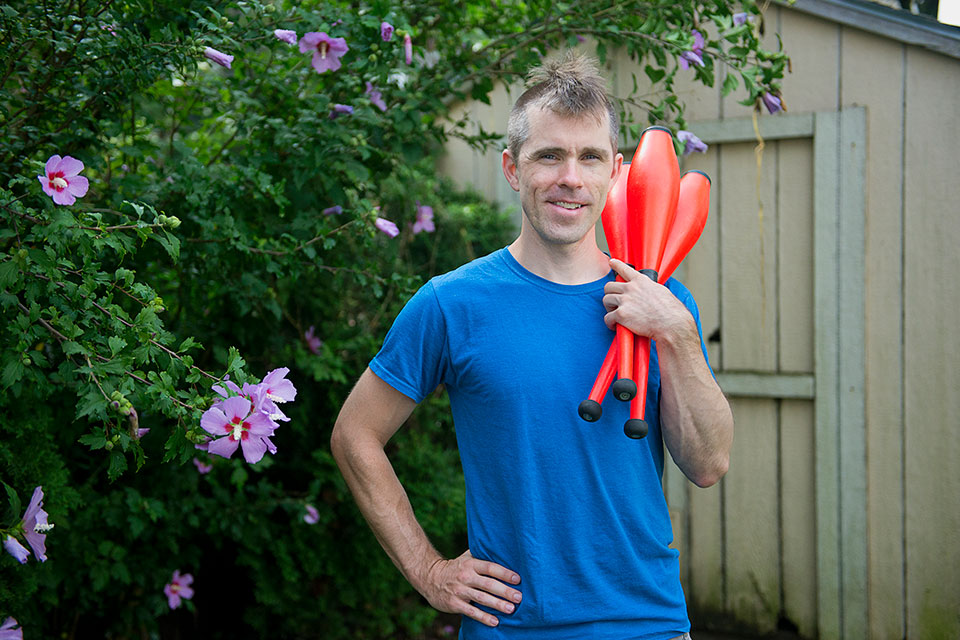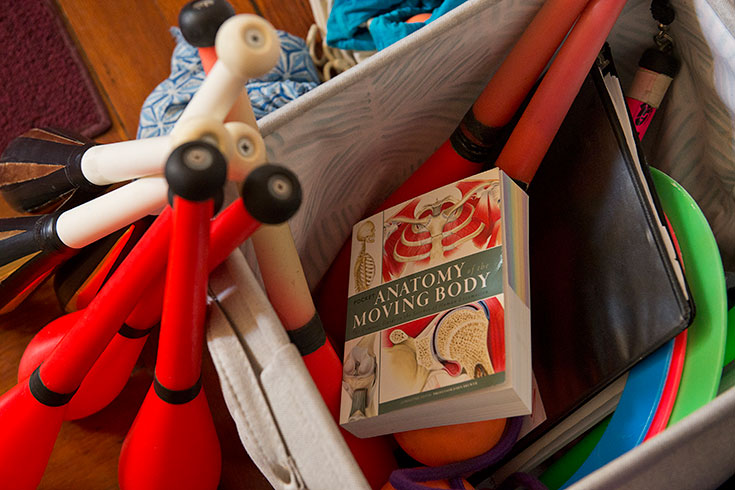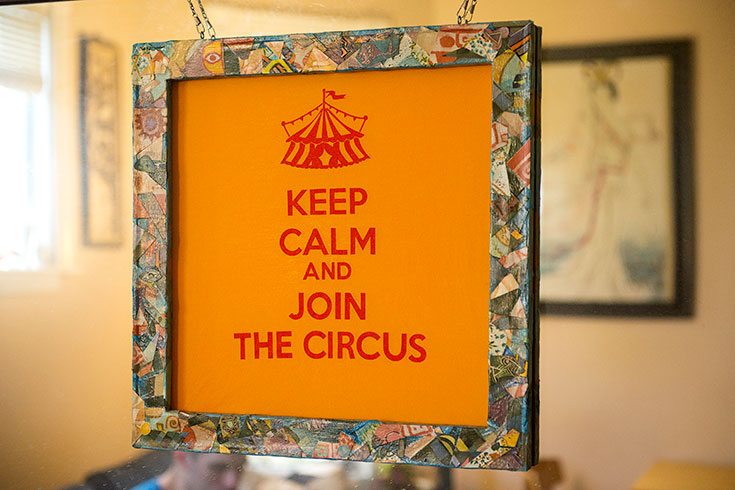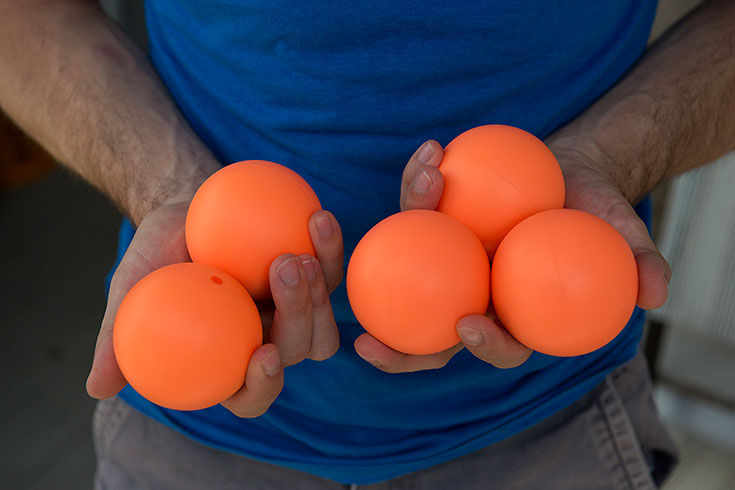Tim: Treading water financially to do what I love

Tim is a 36-year-old white man who lives in Boston with his longtime partner. He is a circus performer and an acrobatics and juggling coach.
Photo Credit: Sarah Putnam (all photos)
Tim was born and raised in a well-off suburban neighborhood outside of Philadelphia. He and his older brother attended a private Quaker school where their mother was a teacher and school administrator. Tim’s father was a doctor specializing in radiology. Later on, Tim’s brother would also go into the medical field as a neurosurgeon.
In high school, Tim thrived as a student, excelling in all his classes, from advanced math to literature. Active in a range of extracurricular activities, he became especially involved in theater stage design. “I was in all the theater shows. I also did a lot of the technical behind the scenes work for all of the theater shows. My senior project was the lighting design for the middle school show.”
 With the support of his parents, Tim entered a selective private college in upstate New York. Picking up on his high school interests, he studied theatrical lighting design. He also joined and eventually led Barefoot Monkeys -- a circus arts club on campus. By graduation year, he and a group of friends from the club had expanded their skills and were successfully putting on shows of juggling, fire spinning and acrobatics. They decided to all move to Boston together to begin their post-college lives.
With the support of his parents, Tim entered a selective private college in upstate New York. Picking up on his high school interests, he studied theatrical lighting design. He also joined and eventually led Barefoot Monkeys -- a circus arts club on campus. By graduation year, he and a group of friends from the club had expanded their skills and were successfully putting on shows of juggling, fire spinning and acrobatics. They decided to all move to Boston together to begin their post-college lives.
In Boston, Tim worked in lighting and stage design jobs. As he did so he started to question his desire to continue in the field given its rapidly evolving technology and required knowledge of advanced computer programming. On the sidelines, he continued to cultivate his skills in acrobatics, juggling and spinning by taking classes and practicing with friends. He immersed himself in the Boston area circus arts community. Within a few years, he had fully transitioned into the professional field of circus arts.
Over the course of about ten years, Tim has successfully built a career combining performing and teaching in the circus arts. While there is usually an uptick in performance jobs in the summer months, it is difficult overall to predict how many of these gigs he will get over the course of a year. Tim performs at a range of venues – company holiday celebrations, street fairs, festivals, children’s birthday parties, and others. Although he has done solo shows, he often works with a team of performers, which is something he enjoys a lot. “I love being onstage, in front of people. It’s a great feeling, when people are laughing and clapping for you. And, I know it sounds odd for a performer, but I’m actually not the most social person. But, the performance gives me a context and script for being out in front of people. And I love working with my peers who are so talented.”
 In addition to his performance jobs, Tim is a part-time teacher at a local circus arts school. He offers classes and private coaching sessions in acrobatics, fire arts and juggling to a range of people, from adults with a background in the field who are looking to improve a particular skill to children who want to learn how to juggle. In contrast to the performance aspect of his life, these activities give a measure of predictability to his schedule. The work of teaching is deeply fulfilling for him. The teaching that I do is very important to me. There’s something really special about seeing people work and work on something, and then finally accomplish what they set out to do.”
In addition to his performance jobs, Tim is a part-time teacher at a local circus arts school. He offers classes and private coaching sessions in acrobatics, fire arts and juggling to a range of people, from adults with a background in the field who are looking to improve a particular skill to children who want to learn how to juggle. In contrast to the performance aspect of his life, these activities give a measure of predictability to his schedule. The work of teaching is deeply fulfilling for him. The teaching that I do is very important to me. There’s something really special about seeing people work and work on something, and then finally accomplish what they set out to do.”
With the onset of the COVID-19 pandemic in early 2020, Tim found himself suddenly without any performance gigs; these normally accounted for half of his income. Although he was able to mount a few online classes, his teaching activities declined as well. Due to some eligibility complications, he was unable to benefit from the Pandemic Unemployment Assistance (PUA) program. Tim dug into his savings that he had been hoping to put into buying a house with his partner. Fortunately, Tim’s partner of twelve years retained her job as a teacher at a private school and she was able to pick up some of the expenses.
Tim is reluctant to ask his parents for financial help but he knows they are a “lifeline”; he can always count on them if necessary. A few years ago, at a time when he did not have health insurance, Tim had an accident while performing resulting in a serious neck injury. “I came home from the hospital and found these huge hospital bills waiting for me. I was tearing my hair out. Then my dad got on the phone to the billing people and talked to them like a doctor, like one health professional to another. He was able to sort the bill out and he paid half of it. I paid off the rest myself. Since then I’ve bought private insurance, which costs a lot and doesn’t cover much. But at least I have something there and I do work in a profession where there’s a greater than normal chance of accidents and injuries.”
 The pandemic has been a time of introspection for Tim. He loves the circus arts but thinks about moving into web design work, even as he dreads the thought of shifting from a job with activity to one in which he sits behind a desk all day. Now, more than ever, he is sharply aware of the limits and uncertainties of the career path that he has chosen. As he gets older, he finds it more and more physically difficult to do performances in the way that he had in the past: “I used to be the guy who did a lot of tumbling and backflips and jumping off from high places. These days the impact of those things is hard on my body and I worry about injuring my spine.”
The pandemic has been a time of introspection for Tim. He loves the circus arts but thinks about moving into web design work, even as he dreads the thought of shifting from a job with activity to one in which he sits behind a desk all day. Now, more than ever, he is sharply aware of the limits and uncertainties of the career path that he has chosen. As he gets older, he finds it more and more physically difficult to do performances in the way that he had in the past: “I used to be the guy who did a lot of tumbling and backflips and jumping off from high places. These days the impact of those things is hard on my body and I worry about injuring my spine.”
Besides the physical challenges, Tim thinks about the financial costs of staying in the circus field as well. Even before the pandemic, he was making just enough to survive but not much more than that. Neither the performance nor the teaching work that he does provides him with health insurance and retirement benefits. It has been demoralizing to try to buy a house with a financial profile that makes him seem like a poor credit risk to mortgage lenders. Tim is also conscious of his inability, given limited income, to save and invest money for the future; his parents have taught him about the importance of financial planning. He struggles between these practicalities with the draw of doing what he loves: “I know that I've purposefully chosen a path that makes me happy, but it's not necessarily the most lucrative path. I’m treading water financially to do what I love”. He is in the midst of a turning point, looking for the best road ahead of him: “I see the end of one chapter for me but the one ahead is still a bit of a mystery.”